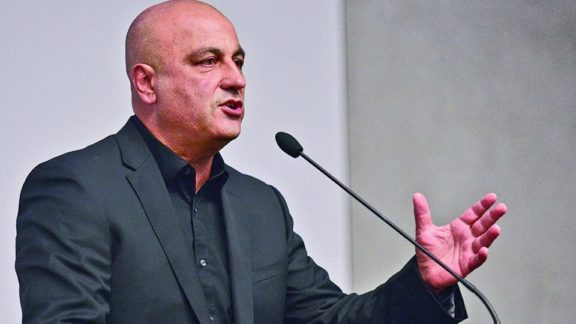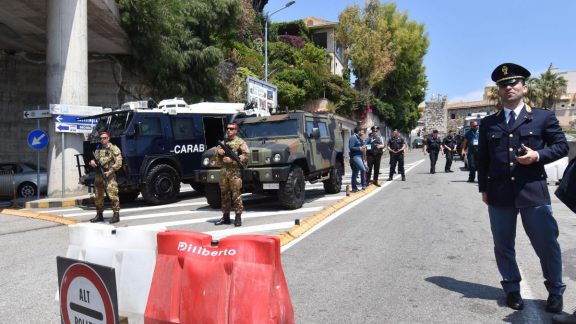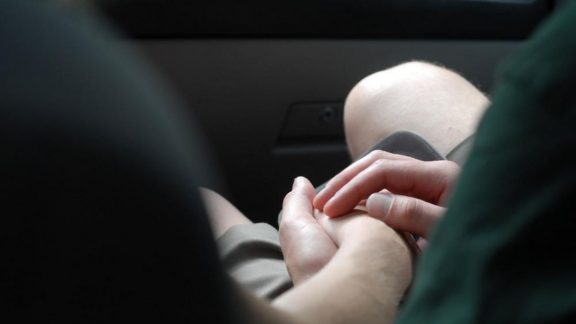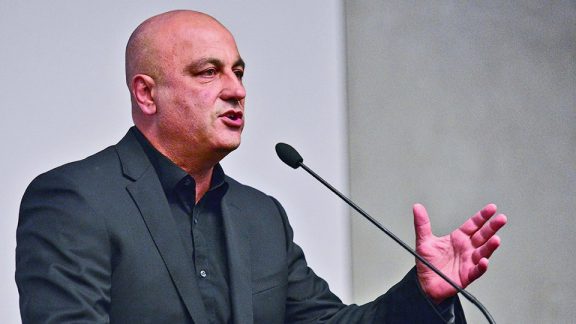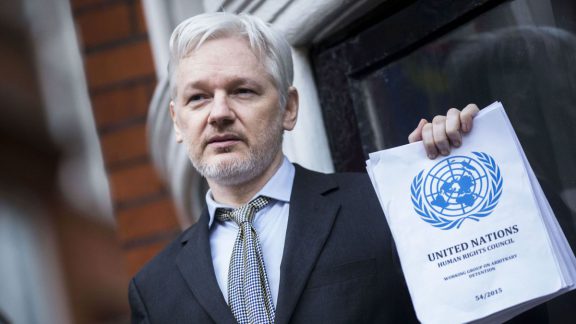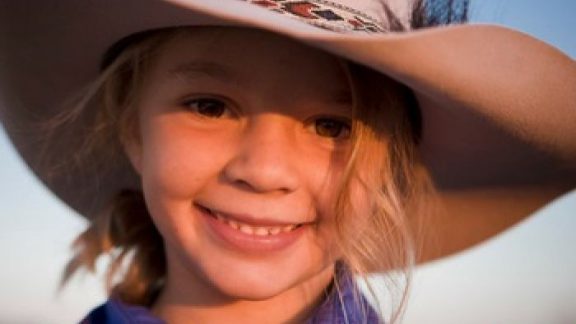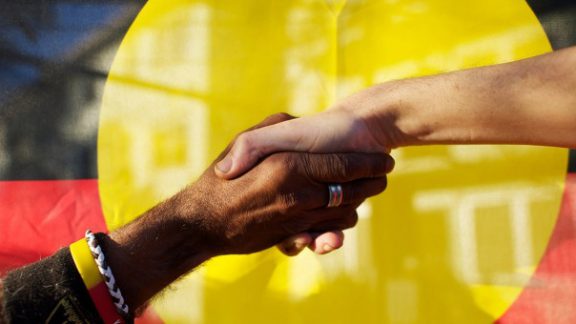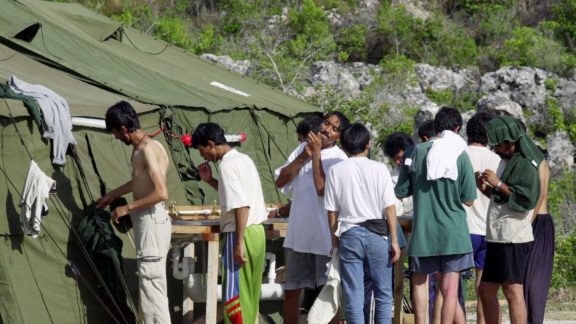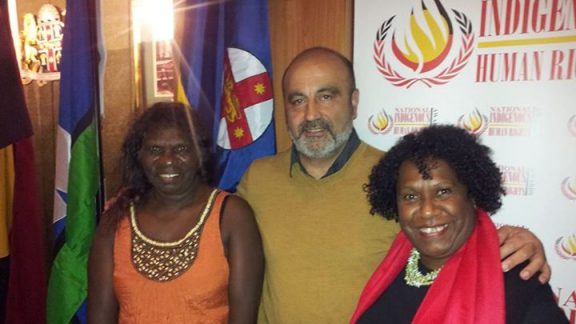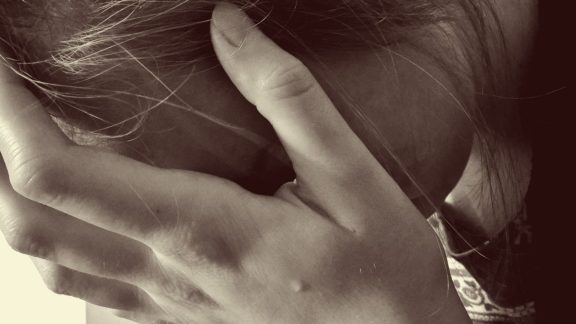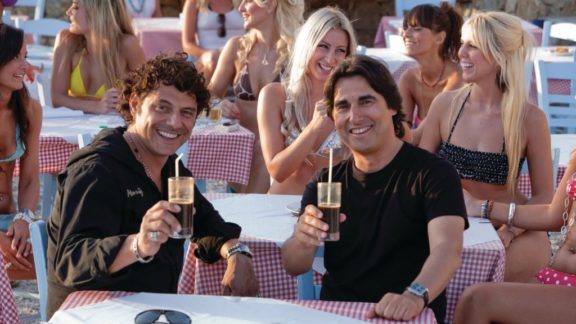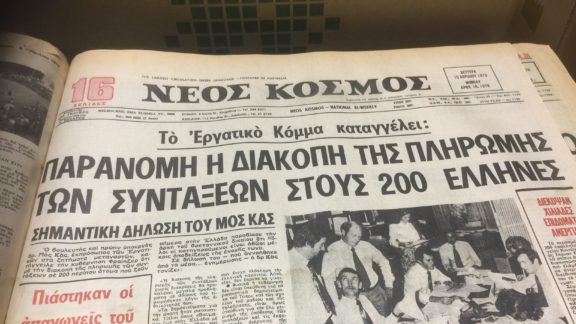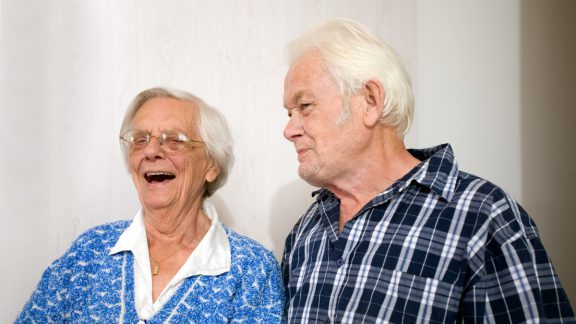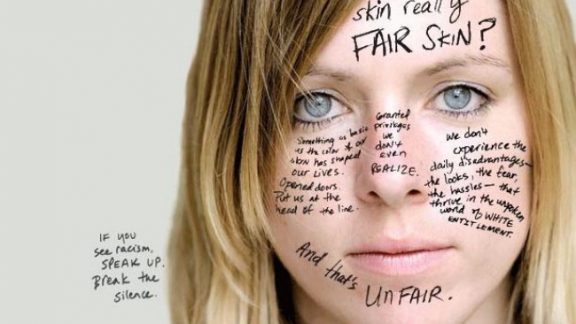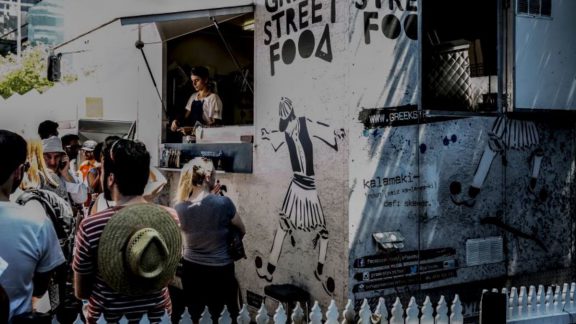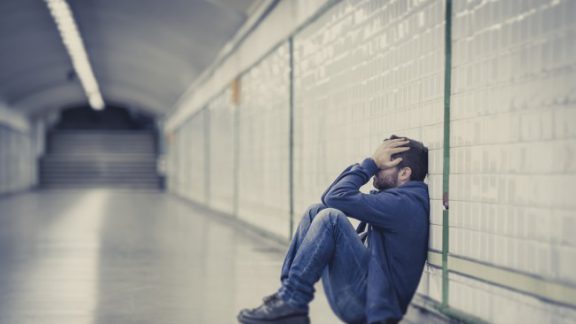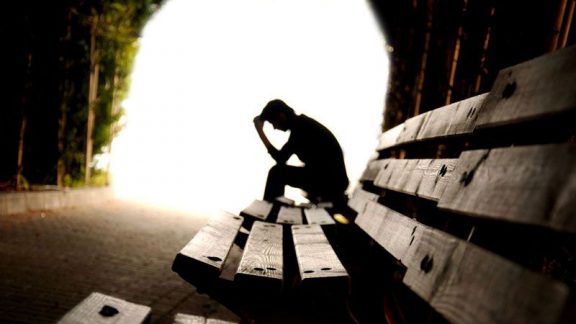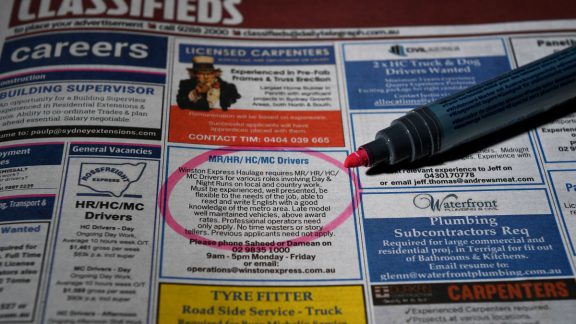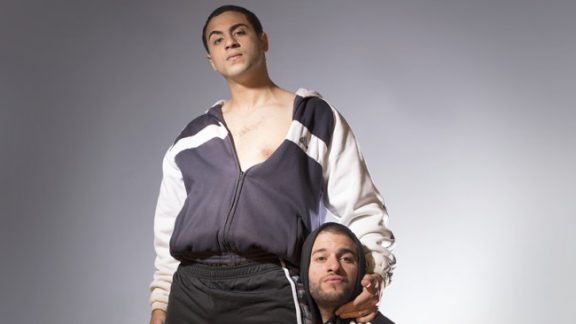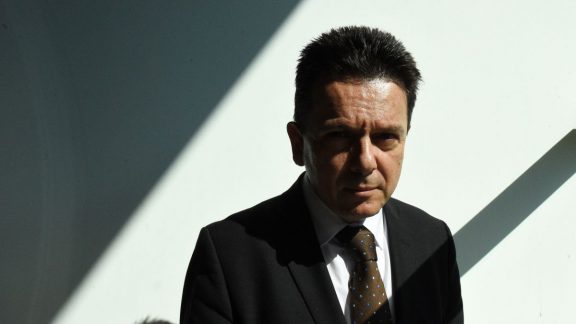Misoxeny – Μίσος των ξένων
Misoxeny continues to play out daily in the Australian landscape, throughout its institutions – you may not see what goes on in boardrooms, but you do see enough of it in our parliaments and certainly in our media.
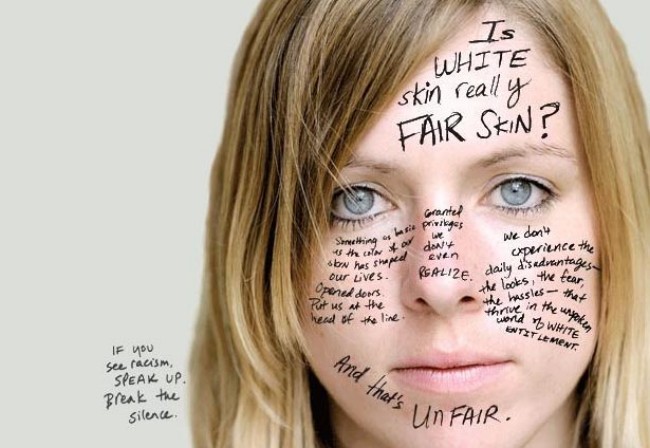
The derivation of misoxeny – hate of strangers – is the Greek word μισοξένος(misoxenos). It is a word that as a child I soaked up and which has stayed with me through half a century of life.
Our nation is haunted by misoxeny, as opposed to the softer version of xenophobia. On my first day at school I could not speak a word of English and understood little around me but I clearly felt different. I was made to feel different and through my early childhood had to understand and navigate difference. It was not long into the school experience that I realised that there were those – some students and particularly their parents, some teachers – who disliked me because of the colour of my skin, because of my surname, who looked down at me and even more so at my parents, hatefully.
Xenophobes – ξενόφοβος – have a fear of others, that is, of the perceived stranger, but misoxenists hate the stranger, the foreigner. It is not fear that we battle and need to reduce and eliminate. There is a hate-filled warring and this is what we need to beat. The Cronulla riots were not brought about by a fear of others – the riots were hate-filled.
In the century since the First Fleet, white privilege took this continent with bloody circumstance and ever since white privilege has clung on for dear life, tied to its oppressor/oppressed dichotomies and have reaped rapaciously while black and brown were denied citizenship. Rude power imbalances imposed a ‘White Australia’ assimilate or perish doctrine.
In the theatre of the oppressed – sustained by madness and cruelties – eugenics smashed inequalities onto Aboriginal and Torres Strait Islander peoples. The Canberra-based policy makers and legislators sponsored the eugenics. They were not well-meaning as racist historians try to storytell. What occurred on the missions and reserves, the ruthless indoctrination, is there for the right-minded to understand and abhor. The constant denials by apologists are not veils and layers of racism but are indeed outright racism.
While some people assimilated instead of perishing, tens of thousands of others were left to rot and perish on the missions and reserves. The children and grandchildren of those beaten to a pulp – psychologically and physically – on those missions and reserves are today the most vulnerable of the vulnerable, filling the prisons and taking their lives at among the world’s highest suicide rates. Migrants were not spared, that is, migrants of various colour and ethnicity. Even for those who were prepared to assimilate rather than perish, misoxeny corralled them into doing away with respect for their heritage, their mother tongue. Hate sneered at them and they were ostracised and excluded from the mainstream institutions. The lot of migrants during the first six decades of the last century was particularly hard – they were dagoes and wogs – excluded, ostracised, frowned upon, mocked. This was the lot of particularly non-English-speaking migrants. They were told that if they sucked up to white privilege they could pursue various aspirations.
This nation is yet to be defined and it cannot be defined nobly until it resolves the Aboriginal and Torres Strait Islander rights struggle, the most profound rights struggle in this nation. This nation cannot be defined nobly till it sets aside white privilege for a poly-cultural nation. This nation’s history is polluted by violence fuelled by racial hate. Migrants were hated. Migrants needed to understand their place and they were never to get into the way of white privilege. The race riots were not limited to the 1860s, 1920s and 1930s.
More than one-quarter of the Australian population has been born overseas, one of the highest proportions among the world’s nations. However, the demography of the Australian nation is not reflected in our parliaments, in the nation’s boardrooms, or in the media. Nearly 90 per cent of the nation’s parliaments are polluted by white privilege. Similarly the nation’s boardrooms and the media and therefore the nation’s conversations are not poly-cultural.
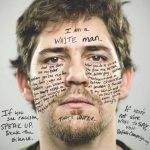
For black and brown, managing these power imbalances is exhausting. The calls for power sharing fall on deaf ears. Privilege is another name for exploitation. Racism is a tool with which to exploit. Inequalities are about power imbalances so to ensure ongoing pathways. During recent centuries colonialism acquired “unearned assets” (Peggy McIntosh) for the whites. Faith that white guilt can address the wrongs of the past is misplaced. If this were true then the media, the boardrooms and parliaments would reflect the demography of the nation.
Whiteness has accumulated social privileges. Whiteness is a class of its own. White privilege discounts those of its own who live in poverty, who are marginalised; they are an underclass. Whiteness is exploited by those who can fill or aspire to fill the boardrooms, media and parliaments. White privilege is not contraindicated by the circumstance of the penniless white person because white privilege is about preserving the ‘privileges’ and ‘power’ for those at the top of the heap. White privilege is about property and the retention and exercise of influence.
Civil rights movements and the Black Lives Matter movements show up the grim reality of white privilege. White privilege is the product of the colonialists, who sought to rapaciously acquire “unearned assets”. While white privilege dominates we cannot lay claim to an end to racism, we cannot be ‘colour-blind’.
We must stop examining the oppressed. We must examine the oppressor. The oppressor is the problem. White privilege and the oppressor should not be understood through the examinations and chattering of white guilt. White privilege and the oppressor should be examined by the oppressed. Racism is an abyss that only its victims can articulate. If the media’s panels on discussions of racism, inequality, on the oppressor/oppressed dichotomies are finally membered by non-whites then the nation would awaken. But this will not happen anytime soon as white privilege would be challenged, become fragile and shatter.
White privilege does not care if it casts aside and damns universal rights. White privilege fights tooth and nail the inalienable of universal rights. White privilege sells narratives of ‘race’ and ‘problems’ and hardens these narratives among whites and those who will side with whites – assimilating instead of perishing – with not fear, but with hate of the stranger – with misoxeny.
White Australia pasted together federation from colonialism by excluding the black custodians of this continent and tried to wipe out blackness with the missions and reserves and the most obscene social engineering policies and legislation. White Australia’s academics scribbled together the White Australia Policy to keep out ‘black’, ‘brown’ and ‘yellow’. The Australian Constitution and the White Australia Policy were filled with hate. Whites were told to not only fear the stranger but to hate, that if they did not loathe, despise and hate then their select freedoms would be overrun and their unearned assets challenged.
Proselytism persuades racism, manages opinions, slums in disordered thinking, muddled-mindedness. There is no joy for me, no relief in writing about racism and hate, but it is a conversation still to be had and as much as possible must be put on the record. It is not xenophobia but misoxeny that drives racism.
Misoxeny continues to play out daily on the Australian landscape, throughout its institutions – you may not see what goes in boardrooms, but you do see enough of it in our parliaments and certainly in our media.
Hellenes should not aspire to racist white privilege
If the Latino is brown, then the Greek is brown, not white. But how then the betrayal by so many Greeks to whiteness?
Gerry Georgatos
18 January 2017
As an Australian born and bred Greek, with Jewish, Palestinian, northern African heritage, I grew up in the inner western suburbs of Sydney during the 1960s and 1970s. The colour of my skin galvanised white privilege in often alienating me, regularly ridiculing. The consistency of low blows echoed hauntingly. Even to a young child’s mind, racism was something that I understood as cruel and wrong. My mind’s eye lamented; much intertwined with the Greek community, and other migrant communities, the racism wrought sadness, and anger, especially when experiencing the infliction of racism on my parents and others overseas born, of them discriminated. What was most upsetting was to see the oppressor, racism, win. The majority of Greeks and other migrants of my youth who were not white gave up on a polycultural society, and fell into the mantra of assimilate or perish.
No nation that peddles a dominant culture is free from the ugliest forms of racism. Privilege in its rawest self is about exploitation, but even in its greatest calm it is about selfishness. In all its forms privilege is an intended means of control. Those who scoff that there is no oppressor and oppressed dichotomy deny grim realities.

On March 26, 1965, Life magazine featured an iconic photo on its cover of Greek Orthodox Archbishop Iakovos marching with Dr Martin Luther King.
Australia’s first Greeks came as convicts on the first fleets, but the majority of Australia’s first waves of Greeks were no more to Australia than needed migrant labour. Those who drafted the White Australia Policy would have loved to deport Greeks after their labour was no longer needed, just like ‘Kanaks’ were ‘assisted’ ‘home’. Greeks were not considered ‘white’. The White Australia Policy intended to exclude them. It was only Australia’s need for labour that allowed for the majority of the first waves of Greek migrants. So Greeks, like so many other culturally diverse non-English speaking migrants, in finding they could not get ahead in the ways they dreamed of, chose to act out ‘whiteness’, to seek it. Greeks, who had never been part of the wickedness of white privilege, sought the cover of its darkness. But in so doing they let racism remain unchallenged, run rampant, continue to keep this nation hostage – and today we continue on in some of the worst forms of xenophobia and misoxeny, to the point that the makeup, the demography of our parliaments reflect a certain authority to the xenophobia and misoxeny.
Black, brown and white need to come together as one, but none of us should have a bar of white privilege – its racism and classicism, its moral abominations. Migrants are not alone in leaving behind many of their brothers and sisters to rot in racism, to deny the misery-loaded lot of their brothers and sisters. Our black brothers and sisters, many of them in order to benefit from assimilation, also left behind their brothers and sisters to rot on the missions and reserves. One in three of Australia’s homeless are migrants and one in four of Australia’s homeless are of Aboriginal and Torres Strait Islander descent.
Let us not mince words when it comes to calling out racism, to calling out white privilege. The white-skinned Australian population is diminishing in proportion to total population, but this is not reflected in the makeup of our parliaments, government instruments and in the nation’s boardrooms. The nation’s apothegms deny the polycultural prevalence and essence of this continent’s residents.
When the Greek identity was dropped by Greeks and they performed as if white, privileges would come their way. I could not do this because it would be a denial of my parents and of me. The betrayal of identity is to deny the humanity of others and possibly to reduce others to what lampooning portrays. The Diogenic view of the world is one where we are all citizens of the world, with diversity loved. If someone is uncomfortable with someone, that’s racism. White privilege is not only uncomfortable with difference, it is ruthlessly vicious, describing difference at best as otherness or at worst as incompatible.
The problem today is that people are scared of the continuous force of white privilege instead of having a relentless focus on doing in racism. Therefore racism remains ferocious, and its ferocity has been institutionalised.
If the Latino is brown, then the Greek is brown, not white, but how then the betrayal by so many Greeks to whiteness? Archbishop Iakovos, born in 1911 and who passed away in 2005, was from 1959 to 1996 the Primate Head of the Greek Orthodox Archdiocese of North and South America. He railed against America’s white privilege. Archbishop Iakovos stood solid with American blacks in the civil rights movement. The archbishop was the only national church leader with the conviction to walk in the courageous march for voting rights in Selma, Alabama in 1965. He walked alongside Dr Martin Luther King – they held hands. This image was captured on the cover of Life magazine. There was no Greek here kowtowing to white privilege, but instead challenging racism.
White privilege needs to be done away with, because if it remains unchallenged its normative of assimilate or perish will divide others too, as the battle for privileges becomes pernicious. White privilege was synonymous with colonialism. The monocultural invader dispossessed, pillaged, disenfranchised but maddeningly worse, this monocultural invader divided peoples. Silences and cheap debates cannot hide what the Australian consciousness knows happened. We know what the colonialists and post-colonialists did. Only the selfish – the small-minded – choose to flout a different tale. The Australian nation could have been so different today if the colonialist and the first few generations of the post-colonialists had chosen to live on this continent with black brothers and sisters. However, they associated the protection of their privileges with white skin. They chose to deny equality, and to believe in domination. Today, America lives in the demons of its past – of its original sins – and there is penance today for the sins of slavery and indenture of peoples. The majority of the victims continue to be black and brown. Hundreds of millions of peoples in India and tens of millions in South Africa languish in abject poverty because of the sins of the colonialist and post-colonialists. In Australia, nearly one in two Aboriginal and Torres Strait Islanders live below the poverty line. Colonial empires gave rise to racial divides the world over, to the making of poverty of the likes never before known on this planet, to mass deprivations and suffering that no religious-based scripture ever imagined, not even in the cobbling together of the various apocalypses.
Colonialism was about accumulating dominion and resources for white privilege. Relentlessly, many white historians have tried to glorify and justify white privilege, to spin their worldviews as if fact. It angers many who are white, particularly the most endowed beneficiaries of the ‘unearned assets’, when white privilege is called out for its abominable sins. They degenerate to the hysterical.
Why would a Hellene degenerate their identity to associations with white privilege? We can carry on about whiteness studies, examine the oppressor and the oppressed, discuss critical race theory, but in the end, in leaving unchallenged, and worse, in ‘re’-identifying to whiteness, racism remains dominant and we have racialised societies. The construct of Australian and American societies are of such structures and instruments that on a daily basis, there is advantage to the white-skinned individual. It is a sickening society that has allowed for this permeation, where the colour of skin defines success and failure. There is a burdensome sickness earned when someone who is not white acts white to earn advantage. When black and brown go white it is as if whiteness if commodified, or, as Cheryl Harris describes, “whiteness is property” and therefore the presumption of white supremacy.
It is not with whiteness that we should stand, and a Greek should not all of a sudden become white in order to slick into advantage. It is with Black Lives Matter, with an end to racism, that we should stand as Archbishop Iakovos stood lifelong with civil rights warriors and marched in the face of great peril through Selma, Alabama. Greeks should not forget the race riots against Greeks in Perth (1915) and Kalgoorlie (1916). Greeks should not forget when they were wogs, dagoes, greaseballs, black and brown bastards, and the impact of this, and the lives lost, on our migrant forebears. If we do betray others for the sake of various personal benefits, then we leave others behind to be discriminated against, vilified and haunted. White guilt refers to ‘privilege’ and laments what racism did, but white guilt does not do enough to end white privilege and replace this with equality. If we continue to fail to establish the long overdue conversations, led by black and brown, with whites for once listening, on racism, on the ways forward then we will continue to soak up Cronulla riots, Islamophobia, and every imaginable xenophobia and misoxeny.
‘Wog’ is not the equivalent of ‘mate’
\Why there is nothing positive about calling oneself a ‘wog’
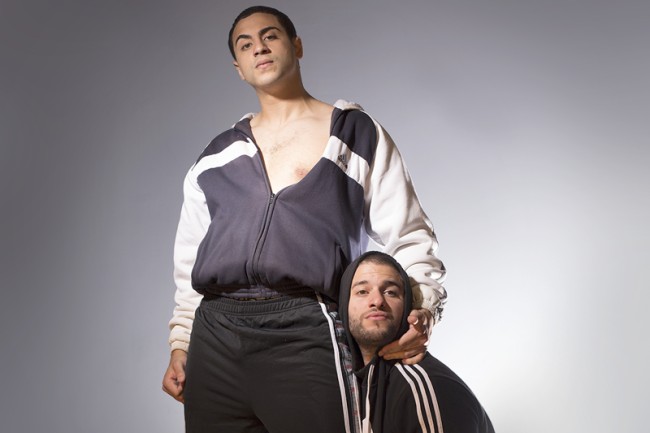
Gerry Georgatos
2 March 2017
There is increasing dissent to the suite of race theories and there are swells of vehement opposition, not all aligned, to what are argued as the politics of identity. The distinguishing of identity is real and, for better or worse, people are labelled, and prejudices, stigmatisation and other associative identity issues leading to discrimination are fact, the norm. To resist understanding the origins of a problem culminates in the perpetual languishing of the problem – and in racism’s case, where we fail to call out the cause of racism we perpetuate unfairness and discrimination.
Where critical race discussions are denied scholarly public examination and of postulations of the ways forward we remain hostage to racial divides. The hostile resistance to the undertaking of serious national conversations on racism has led to belittling surface-level discussions dangerously fuelling racism. The outrage is reduced and filtered through narrow lenses of whatever imaginable vantages are available; even through discrimination-laden societal instruments. We are often limited to the narrowest corridors of discourse – for instance through comedy, satire, theatre, books, activism and rallies. These are one-sided conversations and compartmentalised even if they are on the mark in what they are trying to relay. Without a national conversation – an ongoing conversation poly-culturally membered – we risk chasm-like divides, we risk pitchfork standoffs, we risk anger and rage, we entrench racism.
Only a few decades ago, critical race theorisations sought to broker national conversations through comedy. Greek Australian Nick Giannopoulous sought to ‘diffuse’ racism by mocking racism with his theatre production and subsequent syndicated television series Acropolis Now, and subsequently with Wogs out of Work and Wog Boy. They were risk-laden enterprises because mockery is a dicey and often misunderstood medium. Mockery depends on the audience’s ability to comprehend, and that they are well-versed in often deep-seated issues.
In using mockery to reflect on racism one can degenerate oneself to the reductionist and minimalist. Comedy is not a serious discussion but a flickering portrayal, and the portrayal can be opaque, flimsy with its intentions lost to an audience that is without scholarly comprehension.
The derivation of ‘wog’ is not clear but its original and contemporary meanings are clear and aggressively divisive, with the express intention to be cruel and inhumane, determined to separate people, to discriminate. ‘Wog’ cannot be diffused in its meaning. It is not true, as some argue, that wog has devolved to a contemporary slang that suggests wog is equivalent in meaning to ‘mate’. A ‘wog’ is not a mate; a ‘wog’ is someone different. It is a derogatory term and will always remain so. The argument that it’s okay for ‘wogs’ to call each other ‘wog’ and similarly so with ‘niggers’, etc., reduces people to a less-than inheritance in reference to a view of oneself.
A wog is someone whom white privilege frowned upon. Keeping the term alive keeps white privilege furiously burning. Wog is a derogation that accommodates institutionally structured assimilation or perish vantages. In mocking oneself it is often argued as self-deprecating, intending mockery as a vehicle to diffuse tensions between parties. In dissing oneself or on the heritage-laden identity, the affected are reduced to accommodating the dominant culture, to allowing the dominant culture to continue peddling itself. The assimilated perpetuate the power of the oppressor, when with a sense of the inescapable victim they reduce themselves to a remit of scratching out what opportunities – and the quid – that one can within a dominant culture but without upsetting the dominant culture.
Calling oneself a ‘wog’ or a ‘nigger’ is a self-affirming negative stereotype and imagining and contrary to our inalienable common humanity. Wrongs must be railed against, called out, yes mediated, but certainly not affirmed. Wog and nigger must be disassociated in all forms. Any association to such derogation diminishes the positive self, the psychosocial self, dampens human worth and shrinks self-esteem and the damage can be irrecoverable.
A wog is someone who was not white. A wog continues to be someone who is not white. The production of Wogs out of Work attempted to portray white privilege and its pomposity, however, because of the relentless lampooning of oneself there was instead a deepening alignment in the mind’s eye of the prejudices hideously sold by white privilege. Assuming oneself as a wog or nigger asserts white privilege and validates it as ‘well-adjusted’ – or at least by comparison. In Wogs out of Work, second generation Greek Australians were effectively characterised as ‘unemployed’, as ‘dole-bludgers’, fixating their ‘pride’ in owning cars (the Valiant Pacer).
In the production Wog Boy, the character Steve flouts false negative perceptions held by white Australia. Steve cashes in on these negative held stereotypes, validating them and becomes ‘famous’. Inherently the message is that there is a place in white Australia for the ‘wog’. It is the worst form of assimilation and validates the oppressor and oppressed dichotomies. There are no binaries between the oppressor and oppressed, only dichotomies.
My Big Fat Greek Wedding similarly entrenched generalised prejudices and difference. There was little to be understood about inalienable common humanity in the pernicious viciousness of the lampooning. There was only one scene that resonated as a relatively accurate portrayal of Greek cultural norms and which would resonate with any right-minded individual. That was the scene where the father, Kosta, was sitting alone, seemingly in deep thought. His partner Maria walked in on his thoughts. Kosta and Maria reflected an authentic conversation in their concern for their daughter’s looming marriage. At long last they were human and real. The conversation they shared could have been my father and mother – could have been anyone’s parents.
– Kosta: “Is he a good boy? I don’t know.
“Is he from a good family? I don’t know.
“Is he respectful? I don’t know … because nobody talks to me about nothing no more.
“A respectful boy would come here and ask for my permission.”
– Maria: “They fell in love. It happens.”
Despite the nuances with this conversation and modernity’s and post-modernity’s unfolding social justice vocabulary in terms of self-determination, it is a conversation that resonates with every parent and that brings on a coming together in terms of human understandings and meanings.
Critical race theory is a framework of intersections on the examination of societies and cultures and intertwined are discriminatory laws and power imbalances. It is our duty to strive to do away with discriminatory laws and to correct power imbalances and not to reinforce them. The tragedy of white supremacy, nowadays sold as white privilege, continues. White supremacy and its racialised powerbase maintain their horrid obscenity despite the outrage that has been increasingly unleashed at them during the last 100 years following centuries of white privilege expansionism.
No nation that peddles a dominant culture is free from the ugliest forms of racism. Privilege in its rawest self is about exploitation, but even in its greatest calm it is about selfishness. In all its forms privilege is an intended means of control. Those who scoff that there is no oppressor and oppressed dichotomy deny grim realities. Self-labelling oneself as a ‘wog’ or ‘nigger’ evidences the grim. These derogatory terms subordinate the ‘wog’ and ‘nigger’ to white privilege scholarship – to a dominant culture that one must deal in instead of calling out. ‘Colour-blindness’ can only arise in an inalienably equal poly-cultural society – one where differences are positive norms and the shared storytelling of these norms brings people together. An educative transformative approach is more powerful and profound than the presumption that rights-based laws alone in race-conscious-based societies can equitably transform societies to inalienable egalitarianism and to the embrace of coming together understandings. The political and various educative landscapes need to be soaked in shared stories, in storytelling where society is illuminated to not only the norms of one another but also to the experiences of one another.
We can discuss critical race theories and frameworks, liberalism’s rights-based remedies, civil rights scholarship, anti-discrimination efforts, the intersections of this and that, and other critical pedagogy, but in the end racism is racism despite its veils and layers. The onus on racism needs to be two-fold; calling it out and shining the light on the ways forward. But the ways forward are intertwined with the calling out of the racism. Racism is not called out as often as it should be, and the calling out is often poorly articulated or it’s called out by proxy – that is by a white person who hopes to mean well. Hence there remain many Australians who do not understand that racism exists or that it can be overwhelming. They instead regress to a ‘let us move on’ narrative.
Internalising racism is toxic. Any serious commitment to challenging racism must be an intellectual one, not a reductionist one where we mock ourselves and perpetuate the racist’s reality – the ‘black face’ minstrels, Wogs out of Work, etc. Racial power imbalances remain maintained.
Wog is a racial slur.
Paul Keating was right about institutional racism, of white privilege when he said that an event such as “the Cronulla riot has in its antecedents the notion that somewhere in officialdom at the top of the country it’s all right to think poorly of people who come from a different background to yourself”.
“This is, I think, a dreadful letdown for the country after it had succeeded so greatly in settling so many people from abroad.”
The Bulletin was a highly influential political newspaper/magazine first published in Sydney in 1880. Its final issue was published in 2008. However, its motto had originally been ‘Australia for the White Man and China for the Chows’. It was changed in 1886 to ‘Australia for the White Man’. This premise-laden masthead slogan was only removed in 1961.
In 2015, the production Wog Boys performed to large audiences around the nation. I understand the well-meaning intended when Nick Giannopoulos discussed the term ‘wog’, “It’s become a brand for this type of comedy, which is a good thing. I’d much prefer it to be a brand than a racist term.” Despite understanding the premises behind his argument, I disagree. It remains a racism term. It is not true that we can laugh off racism – this has been tried right across the world for three-quarters of a century and it does not work. It deals in a constancy of diminution, trauma and reinforces white privilege.
Some now claim that ‘wog’ is an “endearing term”. Some argue this of ‘nigger’ or ‘Abo’. There is nothing endearing about these terms. There is nothing positive, nothing good, about calling oneself ‘wog’ and ‘nigger’. These terms do not ‘diffuse’ racism. They are racism.
In the war on racism, the migrant-born are forever left behind
As long as we deny the reflection of the demography of the Australian nation in all our instruments then we will continue to deny the long overdue conversation in this country about racism and the ways forward.
Lonsdale Street’s Greek Precinct, Melbourne.
More than one quarter of Australia’s population is comprised of migrants; Australians who were born overseas. In discussions on the war on racism, migrants and the Australian-born children of migrants do get a mention in public discourses but it’s such a token mention, it is surface-level stuff. In terms of outcomes, that is, in the offering of a seat at the table in the highest public offices, in the power-sharing of this nation, there is barely a presence. It’s a sea of white privilege everywhere. The demography of this nation is not reflected in our boardrooms and parliaments.
Rightly, the First Peoples (Aboriginal and Torres Strait Islanders) of this continent, at long last, thanks predominately to affirmative actions, are getting a look-in within the boardrooms, and an increasing presence in the parliaments. This does not mean that the social reforms needed for the significant proportion of First Peoples living below the poverty line will be achieved, but it does mean at least many Aboriginal and Torres Strait Islanders are catapulting their way out of the abominable racism that tortured them for generations. It means that they have the potential to face off with the oppressor, reducing the oppressor’s venom.
There will continue third-world-akin poverty for a significant proportion of Aboriginal and Torres Strait Islanders, long after our generation’s bones are dusted into the earth. In the war on racism, migrant Australians have respected the onus for Aboriginal and Torres Strait Islander social reforms, to end the outrageous inequalities and inequities. But it is now time that this polycultural nation culminates as multicultural. Australia is not multicultural. It is polycultural: home to people from just about every nation, and to cultures which are without a sovereign homeland. But though many of these culturally and language diverse peoples have never been victimised to the same level as our Aboriginal and Torres Strait Islander brothers and sisters, racism haunts and impacts with destructive force.
No nation that peddles a dominant culture is free from racism. In a polycultural nation, the non-dominant cultures are oppressed. When we truly wish to understand one another only then will we learn from one another and come together – only then will we integrate and live alongside, instead of apart. Multicultural signifies intertwined and integrated whereas polycultural signifies many but not necessarily intertwined and integrated. As long as the dominant culture peddles its axioms and refuses to share power then racism will be exploited. Anger and hate will spread perniciously as Australia in modernity is a firmament of testaments to the racism, anger and hate.
Nearly 90 per cent of our federal parliamentarians are representatives of white privilege – borne of it and who have experienced little outside of it. If the political machinery of this nation were to reflect the demography of this nation in our federal parliaments then the turnaround would ensure two-thirds of our parliamentarians are of Australians of a parent born overseas and who spoke a language other than English. The domination by white privilege in our federal parliament is also reflected in the highest offices and boardrooms of this nation. In the last couple of years the boardrooms I have visited right across the nation have had, yes, ‘an’ Aboriginal and/or Torres Strait Islander but otherwise comprised nearly 100 per cent of white privilege.
What aches are my personal experiences with the life-and-death spaces I am involved in; suicide prevention and postvention. Migrants account for more than one quarter of this nation’s suicide toll. Migrants also account for one in three of the nation’s homeless. The historical narrative of migrant success stories hid the extensive narrative of failed efforts, the litany of broken lives. Migrant suicides contributed to the nation’s high suicide rate in the early 1960s. The Australian suicide rate peaked in 1963. But migrant suicides are again on the increase. At this time I am effectively the only individual in the nation writing about migrant suicides and of the suicides of Australian-born children of migrants. I am the only individual disaggregating to within migrant populations. Migrant suicides are not discussed. They are lost in translation. They need to be discussed if we are to save lives and where lives have been lost to reach families so we can grieve together, that they are supported. Recently, I delivered a keynote speech and a couple of other presentations at the Australian Postvention Conference and I begged that we leave no-one behind.
Sadly, the boards of the major suicide prevention and postvention organisations have no migrant representation. This includes worthy organisations such as Lifeline and Black Dog and so on. Beyond Blue’s board does include Dr Mukesh Haikerwal, who was born in India. But it’s not the norm across the space. On the majority of the various government boards and at the National Mental Health Commission level there are no migrant voices. There certainly needs to be. I know that as usual following my writing about this, that steps will be taken to find someone of a migrant background to fill a seat and ‘tick the box’.
I am someone who gets around this country, has a momentary glimpse into some of the nation’s boardrooms and think tanks, who for the time being glimpses into the political machinery of the nation, but all around me I see white privilege, a sea of white privilege. The war on racism will never be won as long as the demography of the nation fails to be reflected.
As long as we deny the reflection of the demography of the Australian nation in all our instruments then we will continue to deny the long overdue conversation in this country about racism and the ways forward. Instead we soaked up the Cronulla riots and we soak up Islamophobia, every imaginable xenophobia, and the degeneration into misoxeny. This generation has had to cope with eruptions of hatred but the relationships will break down further in the generations of our children and their children. Hatred differs from anger. It was hatred, as opposed to anger, that led to the violence in Cronulla. Instead of intimate relationships with one another in a multicultural nation we will be increasingly siloed into a tension-filled polycultural nation.
There is a distinguishing between fear and hatred – between xenophobia and misoxeny. The degeneration to misoxeny can translate to a generation being incapable of recovery from misoxeny and the duration of the hatred may extend to the ensuing generation. Hatred is pervasive and overwhelms people, obscures right- and reasonable-mindedness. There arises intense feelings when people feel intensely threatened, on both sides of the divide, and the hatred builds. As human beings we can be traumatised by what they feel threatens us. The psychological wounds can become unforgettable, unforgivable for the generation at hand. Let us not blame Pauline Hanson for contemporary racism, for the xenophobia and misoxeny. Pauline represents the voices of many of the xenophobic and misoxenists. The Cronulla riots occurred while Pauline Hanson was out of political office.
White privilege may not be able to manage the racism, the xenophobia, the misoxeny, but then it may serve the selfish interests of white privilege by retaining its dominance in which racism thrives. Preventing the rise of racism requires white privilege to balance the sharing of power, to contextualise it and put an end to the power imbalances, an end to the structural and institutional racisms that deny the demography of this nation its reflection in the boardrooms, think tanks, and parliaments.
In our spheres of influence, we can urge the ways forward; at the Australian Postvention Conference I called for the boards and advisory groups in the suicide prevention and postvention spaces to bring the many together. There are newly arrived migrants at elevated risk to aberrant behaviour, to suicide. So too of the children of migrants and tragically of the migrant parents who are burying their Australian-born children. I have written widely on these tragedies and of the migrant silence; a silence because white Australia is not listening. I have sat with hundreds of families across the nation who have lost a family member to suicide; migrant families, Aboriginal and Torres Strait Islander, of every imaginable Australian background and every family has poured out its heart. We need to ensure they are heard in the boardrooms of the peak bodies, in the think tanks. When we leave any population group, cultural group, LGBTQI, any categorical group behind such as the homeless, the impoverished, the incarcerated, the sexually abused then we discriminate and, yes, it translates toxically, the grief internalises and the damage hits hard.
What is racism? We’re one colour made many
Gerry Georgatos on why racism is a lie that continues to live on
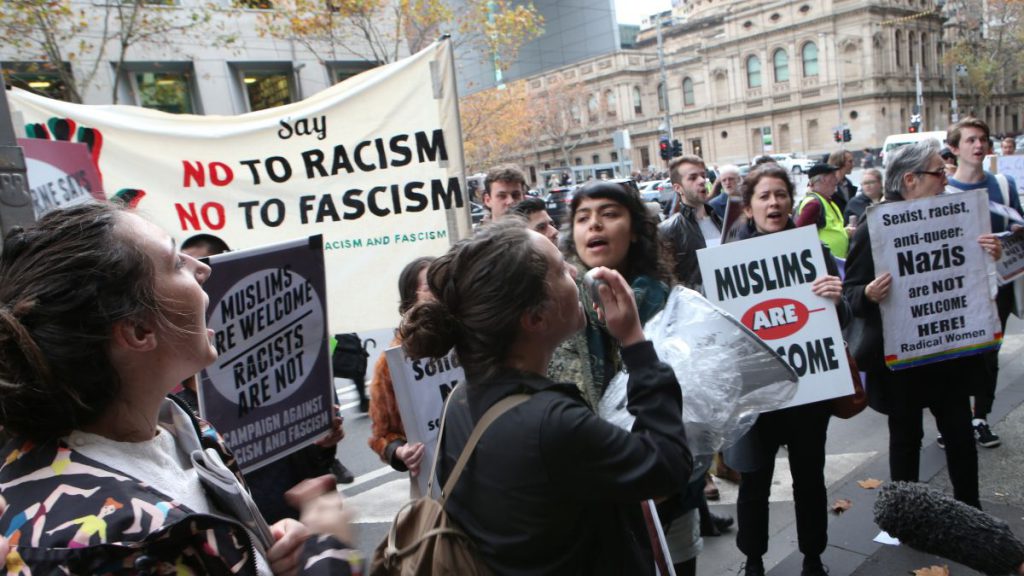
Anti-racism protesters outside the Melbourne Magistrates Court where members of the United Patriots Front were appearing in court on Tuesday 23 May. United Patriots members were facing charges of defacing the footpath and wall of a garden bed outside City of Bendigo offices. Photo: AAP Image/David Crosling
Through the windows of time much can be seen: peace is possible, love can be above all, hate is intense, hate can decimate all hope. We see windows of harmony, civil strife, meaningfulness, warring, redemption, barbarities. Our mind’s eye translates what our eyes see and what our ears hear but for many, much is lost in translation.
The muddle-minded and reasonable-minded swirl alongside in the same cesspool, at times our hands reaching out for each other’s. In calmer moments, we can hate one another, a once outstretched hand clenched into a fist.
Racism rolls in the deep, tearing us apart and some of us drown. But who told of us racism? That we are different? That despite being of one ‘colour’ that instead we are distinguishable by colour? Of colour made many.
In the suicide prevention work I do, in my research, in the stories, in responding to hundreds of suicide-affected families each year, I see only people, sameness. I see in each person, in each suicide-affected family every other person, every other family.
Yet there is a madness in humanity in which we are told we are different – ethnically, culturally, with our values and faiths. Yes, of course, nation-building exploits these attributions. We are pitted against each other. Who benefits? Every suicide-affected family I have sat with, no matter the cultural content and sensitivities that have poured from their hearts, all have cried the same, spoken the same. In our history there has been slavery, indenture, and all forms of barbarous and inhumane exploitations. We have seen power at all costs and greed as the bedrock of the cesspool.
We have sunk so low that elites with extraordinary power but trapped in disordered thinking with ruined minds carry on with wilful destruction.
We now imagine difference as a starting point and the subsequent theorisations of critical race theories and of polycultural, multicultural and monocultural societies.
We should start at the origin, not at the bastardisation of humanity where there has been a tearing apart of what was once one, of that which we are born into.
We have been corralled into battles, into race theories and identity politics instead of our sameness despite how we wish to play out and live our lives. We are denied freedom. Identity is a liability because it has become so big in our minds, bigger than nature intended, and diversity excludes instead of including; monstrous battles.
The distinguishing of people as if there are multiple identities gives way to the manifest of stigmatisation and the advent of discrimination, of dangerous falsehoods.
Racism is a tool, indeed a weapon, to exploit people. No nation that peddles a dominant culture is free from the ugliest forms of racism.
Cultures that peddle themselves as above others have lost sight of what humanity is.
Culture is demographical and categorical but it is not defining of our humanity. Inherently every culture should be defined by our humanity and this freedom guaranteed; our mortal coil is a brief experience, of only so many days on this earth and none of these days guaranteed.
The social justice and human rights journey is a struggle: arduous and regularly defeated, but the journey continues though it becomes longer and the horizon elusive.
The worst enemy is disordered thinking: for too many the mind’s eye loses truth in its translations.
The 13th century’s Durante degli Alighieri (Dante) wrote, ‘Consider your origins; you were not made to live as brutes, but to follow virtue and knowledge.’
Who are we? Where are we from? Where do we go to?
The abyss of racism is deep, it is haunting, scary, and only those who have been in the abyss can articulate the terror. For those who avoid the fall the efforts are wearying and diminishing: diabolical complexities to navigate, and veils to hide behind.
Only those victimised into this abyss have felt the darkness. The brutal hits on the psychosocial self in the abyss are challenged only by the fright and terror of pitchforks at the precipices to the abyss.
Racism takes lives, not just ruins lives. Our prisons are filled with victims of racism. Poverty is littered with victims of racism. Aberrant behaviour is borne of racism, anger displaced to the self and to others, by both the perpetrators and victims of racism.
Racism has toxic translations. It poisons the mind, weakens the heart, and debilitates the soul. It makes for more than just nervous societies, but for colosseums of terror, of warring, of insanity. Narcissism, anarchy and chaos grow violence. Those who gave rise to this, who sowed the seeds, are those who orchestrated ill-gotten gain and built citadels and anonymity.
The British colonialists were not instructed by the masses, but by elites. The British were the world’s biggest slum builders; dividing peoples, fracturing peoples, delivering narratives of mass poverty, promoting tales of cultural inferiority and racialised lies. Their legacies tragically thrive. The filthy deeds of the colonialists, who invaded every region, make humanity a dominion, denying people the freedom they are born into. The historical remains contemporary: racism is institutionalised and is still as omnipresent a weapon as ever.
It is has been said that no lie lives forever but we see this is not so; lies live as if forever in the windows of time. As with the litanies of lies told in the presumed heyday of the European colonialists and in the centuries of human slavery that there is a striving for equality and the alleviation of poverty, so too these lies continue today. Each lie, in each generation, is bolstered by more lies. Despite billions of people harpooned into the direst poverty and stresses by colonialism and ‘post’-colonialism, we are told that hundreds of millions of people are being lifted out of poverty, into the working and middle classes. These lies will cascade uninterrupted into generations unborn. There is more poverty today than ever before, there are more life stressors today than ever before, more people dying in wars than any before and in intertwined in all this is racism, which continues to be played out. More people suicide today than ever before in human history.
Racism is not just an individual act, it is not just prejudice. Tragically it is insidious, pernicious, it is evil. Racism is a complex maze of institutions and structures of whom only a few see the blueprint. The perpetrators continue to use racism, to play out a burden of ‘civilising’ black, brown and yellow, they play out all these colours and associate inferiority, dangers.
It happens that ‘whites’ dominate the structures that exploit the tale of racism – but those who are prepared to assimilate to the obscene tale of a greed so destructive it has humanity in peril, who degenerate to disordered thinking join in the presumption of spoils.
There is no racism among the rulers of the world. That is where racism is seen for what it is: nothing more than a weapon, for racism is not a truth but a lie. Racism is just that, a weapon that whips in hate, hoodwinking the classes.
Only at the top of the pile does it not matter whether one is black, brown, yellow, white; that’s the only bit that can be argued today that has changed – because indeed it’s never really been about colour. We are one colour made many.
Racism provides this lesson, that one can betray fellow sufferers and suffer less, and that a few can get to the table. You do not have to be white to betray your sisters and brothers.
Despite racism’s lie, racism is sold wholesale to the masses. Racism has the masses fighting with each other – with politicians referring to brown asylum seekers as cockroaches; a reference to those who risk their lives in Mediterranean crossings. Cockroaches! Cockroaches?
Racism has made the devil of the Arab, fuelled a crusade against Islam, but established a covenant with whiteness, the West and Judeo-Christian values. In the racism wars it matters little to humankind that children wash up dead on beaches between Turkey and Greece in the bid for asylum.
White immigrants are ex-pats and black, brown and yellow immigrants are both migrants and a threat. This plays out as refugee camps, immigration detention facilities polluting landscapes, and jails are disproportionately filled with black, brown and yellow.
We need to hit the streets and radicalise the conversations, smashing the narrow corridors of discourse which pollute our parliaments and deceive us because lies have proved to live as if forever. Racism is a lie that continues to live.
Why you should never call anyone ‘wog’
Today, reappropriation of derogatory terms as ‘endearing’ terms is in fact misappropriation. There is nothing endearing about these terms.
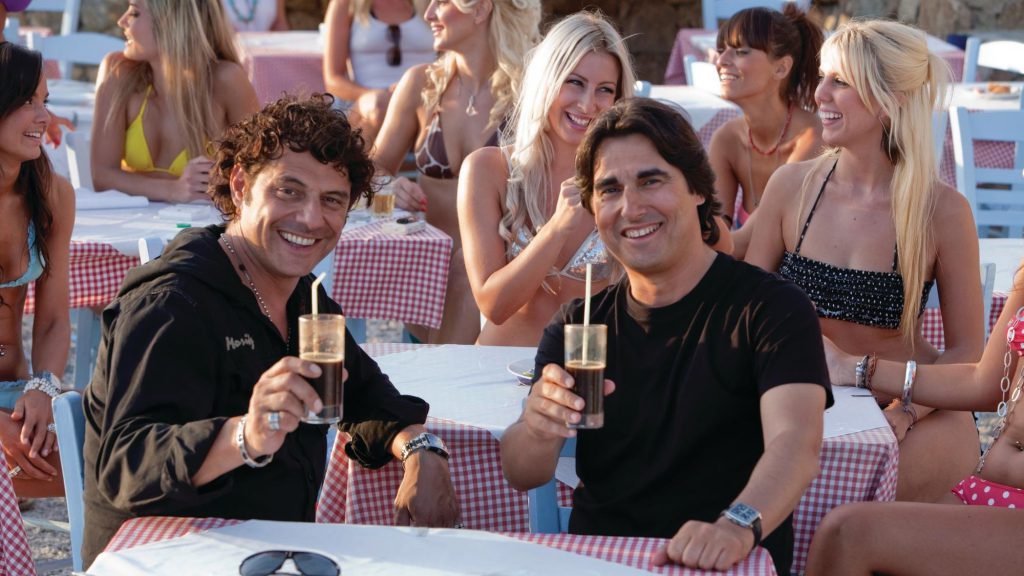
The Kings of Mykonos: Wog Boy 2
There is no reappropriating vulgarity to be used as a counter narrative; you cannot turn cruelty against itself. You cannot make sublime use of any lever originally intended for the diminution of others. Human beings are, before all else, sentient and words linger on; their meanings play out long into the twilight. Our sentience is interconnected and words have powerful effect. Through the power of words, the bastion of language we can be relinquished to structural and institutional –isms, whether racism, sexism, genderisms, ageism, ableism, classism.
‘Wog’ is one of the divisive –ism words I grew up at odds with. Its purpose was to reduce the assailed to a negative self, to lesser than.
Words live in us, and even if words are said to be reappropriated into a counter narrative to mean something else, for many these words continue to carry the burdens of the original meaning. We are cognitive and dialectic beings and our sentience can be widened or narrowed. Negative words can bring about cognitive and dialectic narrowing, reducing us to the muddle minded, to disordered thinking, to negative selves.
The worst of negative language are derogatory words. These words can hit hard the psychosocial self even when it is claimed that these words have lost their power to wound and even when we believe we are using these words against the oppressor. Derogatory language can last much longer in the thinking of people than inspiring words.
‘Wog’ and ‘dago’ have long lingered in the haunts and recesses of my mind, decades after their once near daily usage. The reappropriation of these terms does not reduce them, nor do I see them as the contemporaneous bedrocks of an authentic counter narrative of resistance; they remind me only of the original sins.
We are all people, no more and no less, despite the sum of our individual experiences. Because humanity has racialised itself with deep wounding in order to fathom mires of shameful selfishness, to defend inequalities and the litany of wrong doings and of their perpetuation we have learned to deal in the bog of promises of incremental change. I am repulsed by the incremental because it accepts the diminution of peoples and justifies unhappiness, miserableness, pain and suffering, intergenerational traumas.
I often write of the White, Brown and Black, but I do so with a capital letter – as not to objectify and perpetuate the reductionist.
I capitalise so as to not diminish while accepting that for now we are racialised and this will remain so while an intersection with poverty and inequality oppresses people, contrived by other people – the oppressors.
‘Nigger’ and ‘wog’ are vulgar words borne out of the worst of muddleheadedness. They deny the kindred spirit. The late civil rights campaigner Dr Maya Angelou described words with a capacity to “stick”. Dr Angelou argued that words become part of us, they carry a heavy weight and can inspire us or burden us. “Someday, we’ll be able to know and measure – as mad as it sounds – we’ll be able to measure the hostility or the kindness that emanates from certain words that people exude when they say certain things.”
With the naive reappropriation of derogatory and vulgar words and language we are entrenching in our vernacular the slurs that we needed to get away from. Our carry of language is becoming a bastion of –isms, dividing peoples, hurting peoples, reducing people to difference and lesser.
The positive psychosocial self is founded in positive belief systems, positive language, inspiring words, powerful words, love and the kindred. The LGBQTI community have reappropriated slurs such as ‘dyke’. There cannot be oppression without slur and there cannot continue institutional and structural –isms without the reductionist, with the slur. The slur is a powerful tool for the purpose to exploit to an unjust, unfair outcome.
In the unfolding pursuit of social justice and human rights, in the coming together of us as people, we must lay down as much of that which burdens us.
I am of Greek heritage, the first-born of Greek migrant parents, working class. In my blood there is Palestinian, Jewish, and northern African. My daughter has all this and more in her blood and in the prospect of our common humanity are the dawns and the mornings, afternoons and evenings of our hopes.
In the inner west of Sydney during the 60s and 70s the colour of my skin made me vividly different. I was the wog. I had no White to make me kindred. I was at best “you people”. The low blows were founded in justifications that only the perpetrators understood. I was a child in a sliver of time in a nation yet to transition to the most rudimentary understandings of how to live alongside those argued as language diverse and also as culture diverse. My childhood was trapped in a corridor of time. Thankfully my youngest siblings over a decade younger than I would be less burdened.
The injurious infliction of racism on my parents and of others overseas born, who could be so matter-of-fact lampooned, ridiculed, discriminated, dismissed burned deeply. The oppressor always won. We were a polycultural society, certainly not multicultural. Many assimilated rather than perish. They journeyed to the edges of where the privileged allowed them to.
When my bones are finally at rest, soaked into the earth, so too will be reduced memory of the –isms and of the burdens of –isms that I lived. My daughter will carry less burden than I did. I carried less than did my parents. They were wogs and dagos, lampooned because of a weak command of the English language, because they were distinguished as having different morays and norms. They were reduced to caricature and maltreated as such. In their mother tongue they were fluent, they were intellectual, and they were not caricatures.
Race theories matter despite the argument that identity politics are turning people against each other, fragmenting us. It is true that identity politics has a nasty turn and like all else is exploited, where carpetbaggers ply their wiles. It is a place of lies but also of truths.
However the distinguishing of identity is real because we have made it so and continue to make it so, tragically.
Stigmatisation and other associative identity issues that prosper discrimination are fact, the norm. To resist understanding the origins of a problem culminates in the perpetual languishing of the problem – in the mires of its unfairnesses.
The outrage is reduced and filtered through narrow lenses, dished to audiences but not to revolution. Stampedes may be had but not revolution. We are limited to the narrowest corridors of discourse, to the littlest agency – for instance through comedy, satire, theatre, books, activism, and rallies. These are one-sided conversations and compartmentalised even if they are on the mark in what they are trying to relay.
However any agency that can lead to startling change, to reform and transformation, to revolution is stopped.
Today’s abomination is that we only shout and rage but we do not confront one another and that we are not allowed or do not strive for the platforms that will pit us together in conversation. We are reduced to public spectacles instead of the public interest.
In returning where I began, the derivation of ‘wog’ is not clear but its original and contemporary meanings are clear and aggressively divisive, with the express intention to be cruel and inhumane, determined to separate people, to discriminate. ‘Wog’ cannot be diffused from its original meaning and use.
It is not true as some argue that wog has devolved to a contemporary slang that suggests wog is equivalent in meaning to ‘mate’. A ‘wog’ is not a mate. A ‘wog’ is someone different. It is a derogatory term and will always remain so.
The argument that it’s okay for ‘wogs’ to call each other ‘wog’ and similarly so with ‘niggers’, and others damages the positive self, psychosocially is a hit, reducing people to a less-than inheritance in reference to a view of oneself.
A wog remains someone who White privilege frowns and looks down upon. Keeping this derogation alive keeps the worst of White privilege furiously burning. ‘Wog’ is a derogation that accommodates institutionally structured assimilation.
Mockery can mock itself but to what common good? In mocking oneself it is often argued as self-deprecating, intending mockery as a vehicle to diffuse tensions between parties. In dissing oneself or of the heritage-laden identity, the affected are reduced to accommodating the dominant culture, to allowing the dominant culture to continue peddling itself.
The assimilated perpetuate the power of the oppressor and in fact they number up within the armies of the oppressor. They lived with a sense of the inescapable and surrendered to calling it ‘reality’ and as they became victims instead of the resistance, they left behind those who could not compromise integrity, they left them to rot.
Calling oneself a ‘wog’ or a ‘nigger’ is a self-affirming negative stereotype and imagining contrary to our inalienable common humanity.
Wrongs must be railed against, called out, yes to being mediated but certainly not affirmed. Wog and nigger and all other derogations must be dissociated in all their forms and uses.
Any association to such derogation diminishes the positive self, the psychosocial self, dampens human worth and shrinks self-esteem and the damage can be irrecoverable.
A ‘nigger’ above all is someone who is not White. A ‘wog’ is someone who was not White. In the strict definition of what being White meant, a wog continues to be someone who is not White.
Being called a wog is about hideous prejudices. Assuming oneself as a wog asserts White privilege and validates White privilege as superior.
No nation that peddles a dominant culture is free from the ugliest forms of –isms.
Derogations have only one calling, to subordinate.
We can discuss critical race theories and frameworks, liberalism’s individualised based remedies, collective civil rights scholarship, anti-discrimination efforts, the intersection of this and that, and other critical pedagogy but in the end racism and other –isms are racism, are –isms despite however the morphing.
Today, reappropriation of derogatory terms as ‘endearing’ terms is in fact misappropriation. There is nothing endearing about these terms.
There is nothing positive, nothing good in calling oneself or another ‘wog’ and ‘nigger’. They are flouted as mocking, at worst, but are doomed to fail the person whose teeth they grind through.
The nuances intended by present day users of ‘wog’ and ‘nigger’, that the derogation has only found a new host to retain their venom.
Society has become too complex once again for now to ban derogations such as wog and nigger but our calling out these words, all derogations, can educate understandings as to the power of words.
Apparently, ‘nigger’ is used on Twitter more than half a million times a day, ‘wog’ is used thousands of times a week.
Dr Angelou ordered from her home anyone who uttered derogation, anyone who called the White, ‘honky’. Derogations are never euphemisms, they endure toxically.
I will never support a ban on any word however I support and urge for education.
News – 26 Sep, 2012
Greek Australian journo wins media awards for Aboriginal newspaper
Greek Australian journalist Gerry Georgatos has won two multicultural media awards for his work with the newspaper National Indigenous Times.
News – 28 Nov, 2013
Wheelchairs for Kids helping thousands
The WA charity has helped over 25,000 children get their mobility back
Dialogue – 17 Mar, 2017
Suicide an escalating crisis
Gerry Georgatos on why happiness and the dawn of new meanings are the ways forward.
Dialogue – 23 Jun, 2017
What is racism? We’re one colour made many
Gerry Georgatos on why racism is a lie that continues to live on.
Dialogue – 24 Mar, 2017
Greece is not corrupt per se despite perpetual crises
Gerry Georgatos on why Greece, even on surface, is not responsible for its debt crises.
News – 5 Aug, 2013
Georgatos a candidate in WikiLeaks party
Human rights activist Gerry Georgatos will use Julian Assange’s new party to continue his fight
News – 29 Apr, 2016
Migrant suicide is lost in translation
“Support can make a difference”, says suicide prevention expert Gerry Georgatos
Dialogue – 17 Nov, 2017
We are being lied to about poverty – it’s grim
A tragic indicator of increasing poverty and unemployment is the suicide toll, writes Gerry Georgatos.
Dialogue – 8 Feb
The horrendous lie of our generation is the one that poverty is being reduced
There is more poverty than ever before, and there are diabolical efforts to mask this, writes Gerry Georgatos.
Dialogue – 6 Jun, 2017
‘If confirmed a terrorist incident …’ – terrorism is terrorism
Terrorism has been racialised, politicised, propagandised. But in truth mass murder, all bombings, are an act of terror, writes Gerry Georgatos.
Dialogue – 25 May, 2017
Suicide prevention needs people on the ground, not just talk
Gerry Georgatos makes the argument for why funding should be directed to providing people with the support needed rather than research.
Dialogue – 4 May, 2017
Lateral violence
Gerry Georgatos explains how lateral violence is undermining the positive ways forward, especially for the marginalised.
News – 23 Mar, 2016
‘We continue implementing failed policies’
In the wake of the tragic suicide of a 10-year-old girl in WA, suicide prevention researcher Gerry Georgatos describes how the system fails people and leads to racism.
News – 1 Aug, 2016
‘We have known for years what has occurred in the NT juvenile detention facilities’
Activist and suicide prevention specialist Gerry Georgatos believes that the Don Dale incident is proof of Australia’s systemic racism.
Dialogue – 26 Apr, 2017
WikiLeaks – in the face of betrayals they remain heroic, guarding a Thermopylae
Gerry Georgatos on WikiLeaks, ‘one of the world’s most remarkable organisations [that] continues despite numerous attempts to shut it down’.
News – 19 Jan
‘Suicide is the issue of our times’
Suicide prevention researcher Gerry Georgatos on the pressing issue that is taking more of Australia’s young people than any other unnatural cause.
Dialogue – 8 Sep, 2016
The suicide prevention space is immature and inauthentic
Gerry Georgatos addresses Australia’s humanitarian crisis taking more than five per cent of Aboriginal and Torres Strait Islander deaths – suicide.
News – 5 Oct, 2012
The milk of human kindness
“Do in life what is right and when people ask of your deeds and words, be able to account for them on the spot,”.
Dialogue – 7 Sep
Australian crimes against asylum seekers
Future generations will damn the present for its atrocities, as we damn and indict the past for theirs. The offshore custodial predicaments that have degenerated to indefinite immigration detention will …
News – 9 Jul, 2014
Future Ancients
An account of the first ever National Indigenous Human Rights Awards
Dialogue – 14 Sep
Fading light
The death of a child is always heartbreaking, but when it is by suicide, it is as devastating as it gets, with long term negative psychosocial effects for those left …
Dialogue – 22 Dec, 2017
Whatever Christmas is about, it should be about much more
Do not let those around us who are doing it tough do it alone, do not let them struggle in silence and dangerously internalise grief.
Dialogue – 1 Dec, 2017
Migrant homelessness on the increase
Australia has registered nearly 110,000 of its population as homeless but the real number is nearly three times that, around 300,000.
Dialogue – 2 Feb
Why you should never call anyone ‘wog’
Today, reappropriation of derogatory terms as ‘endearing’ terms is in fact misappropriation. There is nothing endearing about these terms.
Dialogue – 18 May, 2017
Climate of hate
There is a capacity for hate today never before known; where the hatred of others, be it outright or through signification is giving rise to maladaptive social cognition.
Dialogue – 16 Apr
Syria: Giving up is not an option
There have been millions of casualties as a result of the catastrophes in Syria, with a half million dead, with millions of refugees, with collective human consciousness diminished and reduced …
Dialogue – 3 Apr
Looking back on 1 April, 1978
It was April, 1978, I was 16 years old. I walked into the kitchen as my Dad was listening to the Greek language radio news. He had paused from his …
Dialogue – 5 Apr, 2017
The pursuit of happiness
If social justice and human rights are to continue unfolding then happiness, universal happiness, has to be at the forefront.
Dialogue – 8 Sep, 2017
Our governments are not serious about suicide prevention
World Suicide Prevention Day (WSPD) is held every year on 10 September.
News – 13 Apr, 2017
Opinion: Syria and how millions pay the price in a world of lies
There have been tens of thousands of casualties to ‘coalition’ strikes – most of these casualties are to American bombs.
Dialogue – 18 Nov, 2016
Misoxeny – Μίσος των ξένων
Misoxeny continues to play out daily in the Australian landscape, throughout its institutions – you see enough of it in our parliaments and certainly in our media.
Dialogue – 13 Apr, 2017
In the war on racism, the migrant-born are forever left behind
Why the denial of Australia’s demography will continue to deny the long overdue conversation in this country about racism and the ways forward.
Dialogue – 18 Jan, 2017
Hellenes should not aspire to racist white privilege
If the Latino is brown, then the Greek is brown, not white. But how then the betrayal by so many Greeks to whiteness?
News – 11 Aug, 2016
Migrant suicides – invisible
The migrant population is lost in translation when we discuss this nation’s suicide toll, and the limited data disaggregation is a major part of the problem
News – 18 Sep, 2013
Winners and losers
Georganas and Freeleagus in Labor’s casualties. Liberals’ Mirabella in strife
Dialogue – 22 Dec, 2017
Trauma must never become your injurious oppressor
Some thoughts in anticipation of the New Year.
Dialogue – 5 Jun, 2017
Opinion: Australians are lied to about extent of poverty and levels of unemployment
Poverty is mounting and it is a crisis that will tear at this nation.
Dialogue – 2 Mar, 2017
‘Wog’ is not the equivalent of ‘mate’
Why there is nothing positive about calling oneself a ‘wog’.
Dialogue – 29 Aug, 2017
When are we Australians?
When the debates happened in the 1890s to guide the making of the constitution, it had not been intended to keep out the Malcolm Roberts but to keep out the Xenophons.
Dialogue – 16 Feb, 2017
For the record, Australia’s racism like America’s racism remains intact with no default position
As a nation, we are not better than the sum of the diabolical racism that sees Australian society fractured and many from within the fracture at odds with each.
Dialogue – 30 Jun, 2017
Suicide toll – stop the shameless research, just disaggregate
The Australian suicide toll will not be reduced unless we understand the various circumstances of those at-risk and particularly of those critically at-risk.
Indigenous life expectancy gap ’20 years’
A human rights advocate has disputed indigenous life expectancy gap data, saying Aboriginal Australians live two decades less than the rest of the population.
A human rights campaigner has challenged the federal government’s indigenous life expectancy statistics, claiming the gap remains two decades wide.
Researcher Gerry Georgatos says figures from the Australian Bureau of Statistics have become skewed with more people now identifying as Aboriginal.
In 2013, the ABS estimated Aboriginal boys born between 2010 to 2012 could expect to live to 69.1 years of age – more than a decade lower than their non-indigenous peers.
Aboriginal women, who live to an average age of 73.7 years, experienced a gap of more than nine years.
“The grim fact is that Aboriginal and Torres Strait Islanders are still dying on average more than 20 years less than the rest of the population,” Mr Georgatos said.
He said the Closing the Gap life expectancy target is not on track to be met by 2031.
“When poverty levels, jailing and suicide rates are among the highest in the world and increasing, they make no sense against a calculation estimate that claims the life expectancy divide has significantly reduced,” Mr Georgatos said.
https://www.sbs.com.au/news/indigenous-life-expectancy-gap-20-years
Feel Free To Contact Us At 0123 456 789













